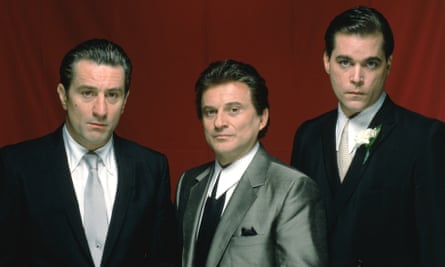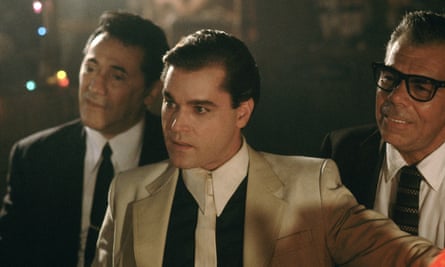Goodfellas at 30: Martin Scorsese's damning study of masculinity

While the acclaimed 1990 gangster drama has been viewed by some as a bro fantasy, a closer look shows an elegant and brutal dissection of male ego
Last modified on Mon 21 Sep 2020 15.57 EDT
A few weeks ago, as if inadvertently anticipating its 30th anniversary this month, Goodfellas found itself the unlikely subject of a Twitter flame war, kicked off by one non-admiring podcaster's viral tweet. "Really sucks that every time you start dating a new guy you're basically signing up to take a 'film theory 101' class of his making," vented Dana Donnelly. "You know how many guys named 'Matt' have given me an hour-long lecture on Goodfellas?"
Replies ranged from "tell me about it" agreement to #NotAllMen indignation to the not-unreasonable suggestion that she should stop dating guys named Matt. But in the process, as is the wont of Twitter discourse, the subject at hand got flattened and simplified on all sides, as Martin Scorsese's landmark 1990 gangster film wound up portrayed as an immutably masculine cultural object, and criticised and defended on those terms.
Donnelly was, of course, far from the first person to characterise Goodfellas as such: the film has been a staple of "movies for men" lists for years, while its unasked-for reputation in that respect was underlined in 2015 in a notorious thinkpiece by rightwing New York Post critic Kyle Smith that began with the headline "Women are not capable of understanding Goodfellas" and got somehow more obnoxious from there. The film, he argued, was "a male fantasy picture – Entourage with guns instead of swimming pools, the Rat Pack minus tuxedos."
Others might mean that description damningly. Smith wrote it as a fan. (Some women, to his surprise, might even share his enthusiasm for such things.) The difference, in any case, is moot, since Goodfellas is no male fantasy picture, and reading it as such requires such selective viewing that you may as well begin and end with the poster that has – yes – graced umpteen dorm-room walls. "As far back as I can remember, I've always wanted to be gangster," runs its tagline, picking up the Henry Hill Jr quote that is also spoken in the film's opening minutes. There's your male fantasy right there, but it's one that Scorsese's film dismantles with brutal elegance, along with the brand of masculinity that subscribes to it.
You might think otherwise if you were to watch a reel of famous highlights from Scorsese's brilliantly immersive, kinetic biopic of Hill, the Irish-Italian-American mobster who spent 25 years in the service of New York's Lucchese crime family only to become an FBI informant in the 1980s. Its most celebrated scenes are indeed alluring ones, beginning with that cornerstone sequence – much taught in the foundational film studies classes that provoke such eye-rolling from the likes of Donnelly – that plunges us into the mafia world via a snaking, unbroken Steadicam shot, as the adult Hill (Ray Liotta) guides his new girlfriend Karen (Lorraine Bracco) through the sharp-dressed bustle and glitter of the Copacabana nightclub. It echoes an earlier long take, shot from the younger Hill's awestruck point of view, that introduces his mob elders in the rosy Aperol glow of a cocktail lounge.
Goodfellas features some of Scorsese's most seductive film-making by necessity: he, along with cinematographer Michael Ballhaus and longtime editor Thelma Schoonmaker, use every trick in their arsenal to show how a 12-year-old boy might easily slip into the care of this violent, potentially ruinous but exceedingly well-lit company. His mobsters are sleek, funny, companionable: they have to commit the odd grisly murder, but their follow-up reward is shooting the shit around a cosy kitchen table while a sweet mafia mama serves them homemade spaghetti and meatballs.

That's the bait, but over its two and a half hours, Scorsese puts equally vivid work into the switch: the light hardens; the editing shifts gears from slow, hypnotic showmanship to antic, nervous twitchiness; the violence gets uglier, less breezily regarded; even the music progresses from woozy soul and girl-group pop to clanging, discordant '70s rock, surrendering into the cacophony of Sid Vicious's My Way over the closing credits. Hill's life accordingly goes from a communal, naughty boys'-club fantasy to a spiralling, coke-addled, socially abandoned fuck-up. A climactic sequence detailing a hazy day of collapsing errands, culminating in Hill's arrest, under the roar of helicopters, is as electrifyingly shot and shaped as those early welcome scenes, but you wouldn't want to be caught inside the screen for one sweaty, suffocating second of it. If Entourage ever pulled the rug out from under its characters this ruthlessly, I missed the episode.
The dynamism of Scorsese's film-making in Goodfellas acts as a double-edged sword: it stokes romantic macho ideals and mocks them with a single cut. Before it exploded into the world, the not-remotely-matched gold standard for mob movies had been Francis Ford Coppola's pair of Godfather blockbusters, which used stoic, sombre rigour and ritual to the present the Mafia as a fascinating covert world of closed doors and secrets, like the Freemasons with sexier handshakes: Goodfellas, by contrast, wielded any amount of formal flash and sizzle to show how easy that realm was to infiltrate, at the subject's peril. Henry Hill was nobody special, briefly made to feel otherwise by a signed-in-blood member's club: as he says in the film's pitch-perfect, dream-bursting closing line: "I get to live the rest of my life like a schnook."
Met with immediate critical acclaim and a clutch of Oscar nominations – mostly unconverted, as Kevin Costner's earnest neo-western Dances with Wolves stampeded to a shoo-in victory – Goodfellas joined The Godfather Parts I and II in the genre pantheon soon enough, their different approaches equally enduring and evocative of an underworld that film-makers still endlessly pore over. The Godfather III, which followed Goodfellas by mere months, has not joined them: rolling off the lurid, corrupted capitalist excess of the 80s, Scorsese made the gangster film that connected more with its moral and stylistic moment.
What Scorsese and Coppola's films have in common is that they're routinely branded as men's movies, despite doing less than sterling PR for the gender. Goodfellas, in turn, plainly planted the seeds for David Chase's revolutionary TV series The Sopranos, a mob saga which paid equal attention to the bleak, bloody, self-serving antics of criminal men and the exhausted women caught in their crossfire: it, too, gets routinely broken down to just its masculine bada-bing iconography in fannish, shallow-focus tributes. It's time Goodfellas and its genre peers were reclaimed from the murk of unexamined male fantasy.
America faces an epic choice ...
... in the coming months, and the results will define the country for a generation. These are perilous times. Over the last four years, much of what the Guardian holds dear has been threatened – democracy, civility, truth.
The country is at a crossroads. The Supreme Court hangs in the balance – and with it, the future of abortion and voting rights, healthcare, climate policy and much more. Science is in a battle with conjecture and instinct to determine policy in the middle of a pandemic. At the same time, the US is reckoning with centuries of racial injustice – as the White House stokes division along racial lines. At a time like this, an independent news organization that fights for truth and holds power to account is not just optional. It is essential.
Like many news organizations, the Guardian has been significantly impacted by the pandemic. We rely to an ever greater extent on our readers, both for the moral force to continue doing journalism at a time like this and for the financial strength to facilitate that reporting.
You've read more than in the last year. We believe every one of us deserves equal access to fact-based news and analysis. We've decided to keep Guardian journalism free for all readers, regardless of where they live or what they can afford to pay. This is made possible thanks to the support we receive from readers across America in all 50 states.
As our business model comes under even greater pressure, we'd love your help so that we can carry on our essential work. If you can, support the Guardian from as little as $1 – and it only takes a minute. Thank you.

No comments:
Post a Comment